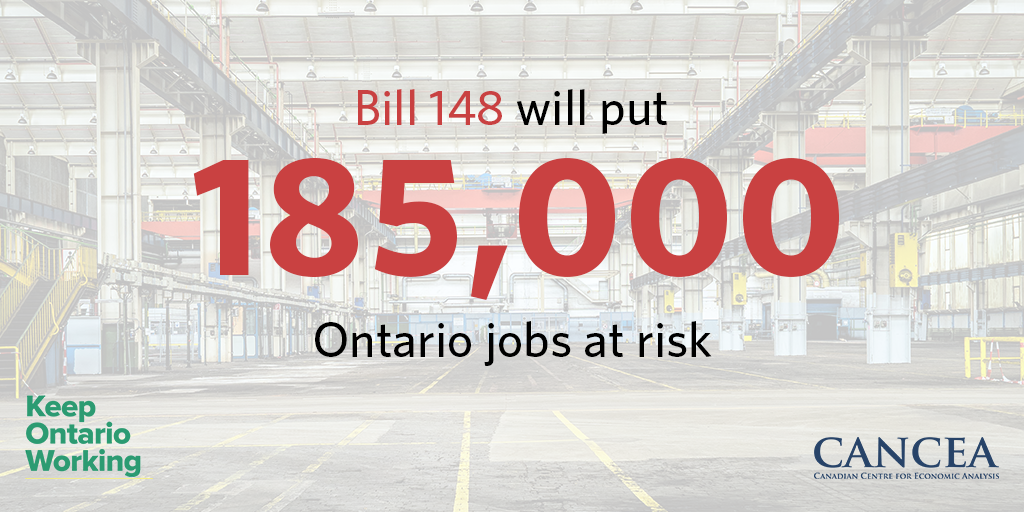Chamber News
Bill 148: Too much, too fast

Today the Keep Ontario Working Coalition (KOW), in partnership with the Ontario Chamber of Commerce (OCC) and the Whitby Chamber of Commerce (WCC), released the first and only independent economic impact analysis of Bill 148, the Fair Workplaces Better Jobs Act. Conducted by the Canadian Centre for Economic Analysis (CANCEA), the study revealed that if the legislation is implemented as currently drafted, there will be significant, sudden and sizable uncertainty for Ontario jobs, economy and communities.
The study concludes that these vast, unprecedented reforms will put about 185,000 jobs at risk in the first two years, greatly impacting Ontario’s most vulnerable workers.
CANCEA was commissioned by the Keep Ontario Working coalition to measure the potential impacts of six key areas of change in Bill 148, including changes to minimum wages, “equal pay” provisions, vacation, scheduling, personal emergency leave (PEL) and unionization.
Data from the economic impact analysis shows:
- $23 billion hit to business over the next two years alone
- 185,000 Ontario jobs will be at immediate risk over the next two years
- 30,000 of the jobs at risk are youth under 25
- 96,000 employees at risk are expected to be women
- 50 per cent increase to inflation for this year and the foreseeable future. The cost of everyday consumer goods and services will go up by $1,300 per household on average each and every year
- The Ontario government would need to borrow $440 million more to cover the increases in new costs from this legislation. If the government were to provide offsets to businesses, as they have indicated, the province’s treasury will take a bigger hit
- Municipalities will be forced to increase employee wages by $500 million without additional offsetting revenues
“Simple accounting reveals that the Act creates a $23 billion challenge for Ontario businesses over two years. Annualized, this is 21 per cent of what Ontario businesses invest in capital,” Paul Smetanin, President, CANCEA. “Given the significant, sudden and sizable changes it would be remiss to expect that unintended consequences would not follow.”
In the coming weeks and months, the WCC will continue supporting our membership by:
- Hosting another event in partnership with the Canadian Federation of Independent Business (CFIB) on Wednesday, August 30 to continue learning about this legislation. This will allow membership to continue learning about this legislation, discussing impacts and next steps.
- Hosting an event in November to assess the delta between the original legislation and that which will most likely pass before the end of the calendar year. Further details to come.
- Maintaining letter writing, with a letter going to our Premier this week; in addition to the letter shared with membership last week that went to the Standing Committee on Finance and Economic Affairs.
- Providing membership with the full CANCEA analysis.
Please continue accessing KeepOntarioWorking.ca and encourage employers and employees to share their stories and contact their MPPs directly. The “share your stories” link will feed directly into a report being prepared by the Ontario Chamber of Commerce and highlights personal and business impacts of this legislation. This is targeted to be shared in September. For further information, please also refer to the Association of Municipalities Ontario submission to the Standing Committee; and the presentation from our Fair Workplaces, Better Jobs Act 217 Summit.
